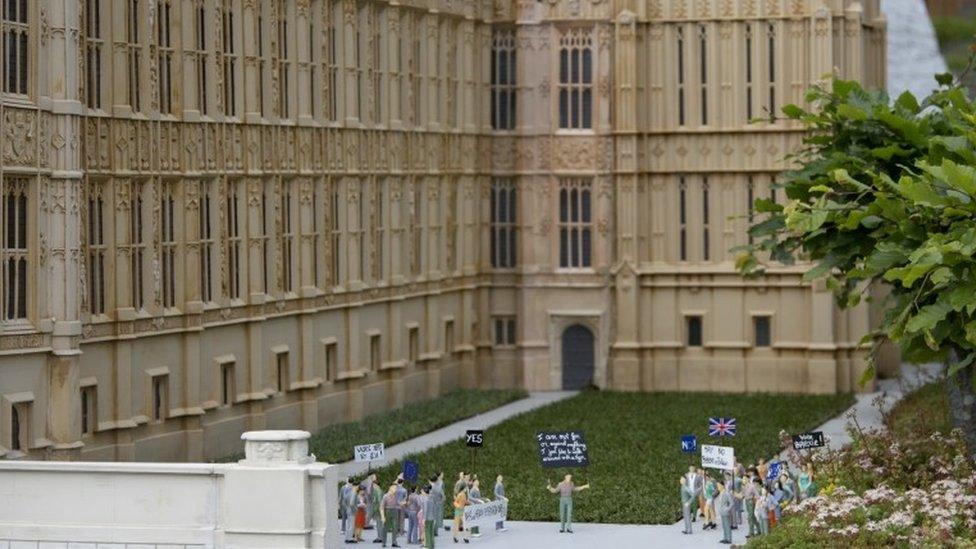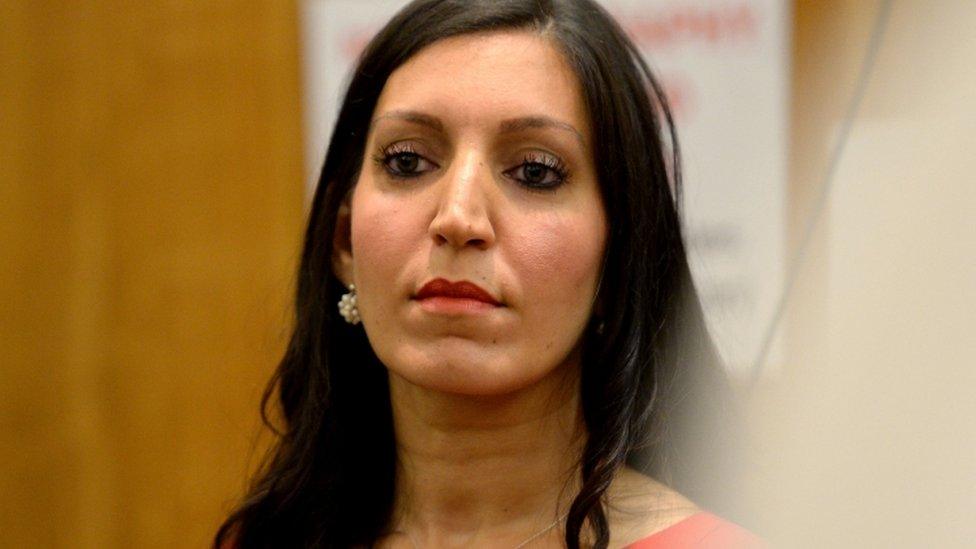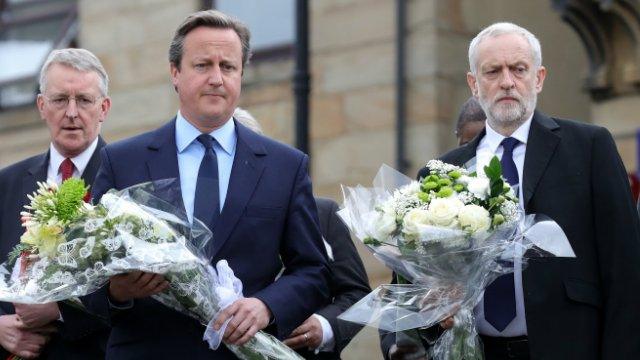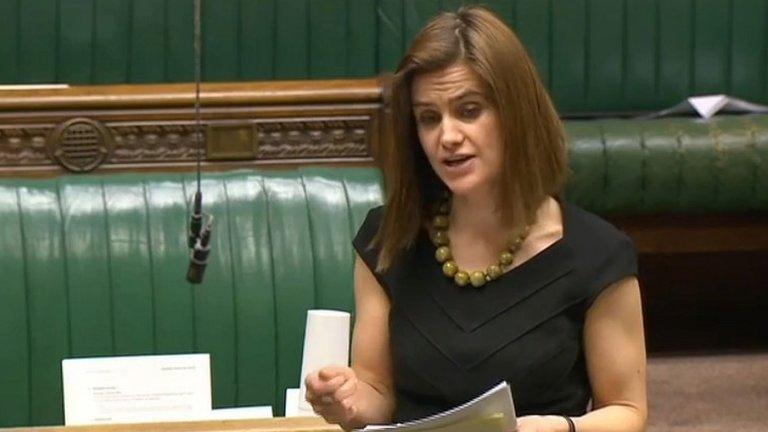Week ahead
- Published

Debate continues: miniature models depict both sides of the British EU debate in front of a miniature Houses of Parliament
This week's preview of next week's parliamentary action comes with a massive health warning: in the event of a victory for Leave in the EU referendum, much of what follows will probably be cancelled or rescheduled to make room for a series of statements and debates on the process for and ramifications of Brexit.
Some of them might even take place on a special Saturday sitting of the Commons, (the first since the Falklands War) if the prime minister so decides.
In the event of a Remain vote, most of what is below will probably take place, although it may be that there is some kind of statement on the result on Monday.
If the week's scheduled business does go ahead, look out for preliminary skirmishing in the Lords over the Buses Bill and the Investigatory Powers Bill, and keep an eye on an interesting attempt by the members of the Public Accounts Committee to amend the Finance Bill - another example of the hot new Westminster trend for select committees to try to push their recommendations into law.
Here's my rundown of the week ahead:
Monday
MPs return from their referendum recess at 2.30pm - when the first business will be Defence questions. It is highly likely that this will be followed by one or more ministerial statements or urgent questions, and somewhere in the mix, the newest MP, Dr Rosena Allin-Khan, who defended Sadiq Kahn's Tooting constituency for Labour, will take her seat.
Then - if the powers that be stick to the published agenda, the Commons will move on to the detail of the Finance Bill - the measure which enacts the Budget.
This will be the first of two days of committee stage - there are Labour amendments to give more favourable tax treatment for low emissions vehicles and to review the tax treatment of workers employed through intermediaries - agency staff.

Dr Rosena Allin-Khan is the newest MP to take her seat on Monday
The SNP's Roger Mullin has an amendment calling for a review of the remuneration of investment fund managers, aimed at ensuring no element of their pay can be taxed as a capital gain.
But the most interesting may be the cross-party amendment signed by, among others, the Public Accounts Committee Chair, Meg Hillier, on tax transparency for multinational companies. The amendment, which I'm told is the brainchild of Labour ex-minister Caroline Flint, comes out of the PAC's hearings on the Google tax affair and the release of the Panama Papers. On the argument that sunlight is the best preventative measure, they want an official register requiring multinationals to disclose where they do business, the money they make and the tax they pay. The clever bit is that the amendment contains a "sunrise clause" so it would not pre-empt attempts to negotiate an EU version of the proposed register, and would only come into force if no euro-register was in place by 2020.
With a considerable cross-party coalition behind it, the amendment is highly likely to be called by the Speaker, who has a track record of ensuring that proposals by select committees are debated.
In the Lords (from 2.30pm) questions to ministers cover countering anti-Semitism on university campuses; clearer use of language to combat the threat of terrorism and improving air quality in Britain.
Then peers turn to the second reading debate on the Investigatory Powers Bill, external. This was passed by the Commons with a considerable majority - but a number of issues are in play. The biggest is that David Anderson QC's review of the operational case for the proposed bulk data-gathering powers is due to emerge before detailed committee stage scrutiny begins, and his recommendations could force the government to concede some major changes.
Ministers have also promised to bring forward amendments on a variety of issues - and there is likely to be further debate on the issue of keeping internet connection records and the level of access to them.
The Liberal Democrats, with a phalanx of 108 peers, are pledged to try to strike down what they regard as the most intrusive parts of the bill - but it is worth noting that Labour backed it at third reading in the Commons, and that the ranks of Labour peers include some pretty hard line former home secretaries, which suggests they will need some pretty serious provocation to attempt to defeat the government - and as ever the mathematics of the House of Lords makes a government defeat next to impossible, if the official opposition does not come out to play.
Tuesday
The Commons opens (11.30am) with Business, Innovation and Skills questions - followed by day two of detailed committee stage debate on the Finance Bill.
In Westminster Hall, the subjects for debate are human rights in Iran (9.30am-11am); conduct of the Chief Constable of Avon and Somerset police force (11am-11.30am); independent advocates for trafficked children (2.30pm- 4pm) - this is former Home Office minister Fiona Mactaggart, who has a long track record of anti-slavery campaigning; the current situation in Bangladesh (4pm- 4.30pm) and guidelines on alcohol consumption from Byron Davies (4.30pm - 5.30pm).
In the Lords (2.30pm) ministers face questions on ensuring open access to transcripts of proceedings in open court, the decision to deny funding to the proposed memorial for enslaved Africans in Hyde Park, and the effects of the charitable status of private education on equality of opportunity in Britain.
Then peers move on to the detail of the Cultural Property (Armed Conflicts) Bill - the bill which (finally) enshrines the 1954 Hague Convention on the protection of cultural property in war zones into UK law. This is a bill with huge implications for the art trade in London and there are a number of amendments down to require auctioneers and traders to assume that an item originating from a war zone has been unlawfully exported, and to provide buyers of cultural property - including antiques - with the information they need to make a decision as to whether the item has been unlawfully exported.
There will also be a short debate on renewable energy and UK energy infrastructure.
Wednesday
MPs meets at 11.30 am for International Development questions, followed at noon by Prime Minister's Questions.
After question time - and any ministerial statements or urgent questions - the moment will arrive for the 20 MPs who won the private members' bills ballot to present the measures they have decided to put up for debate - the second reading debates in these bills will begin (rather later than usual) in October.
The day's main debate will be on an Opposition motion on a subject to be announced, and that will be followed by a Backbench Business debate marking the centenary of the Battle of the Somme, which saw more than a million men killed or wounded. (The casualties included Raymond Asquith, son of the then prime minister, who was killed on 15 September 1916.)

This year marks the 100th anniversary of the calamitous Battle of the Somme
In Westminster Hall, the debates include dog fighting (9.30am-11am) - led by the SNP's Dr Lisa Cameron, who says there must be action to combat this inhumane practice; UK security and entry clearance procedures (11am-11.30am); football hooliganism (2.30pm-4pm); future of the UK cane refining sector (4pm-4.30pm); and automatic registration in UK elections (4.30pm-5.30pm).
The SNP's Owen Thompson has called on the UK government to introduce automatic registration for elections following problems with the voter registration website for the referendum. A member of the All-Party Parliamentary Group on Democratic Participation he says in many democracies around the world, automatic registration is used to avoid a last minute administrative collapse.
In the Lords (3pm) questions to ministers cover HM Revenue and Customs call waiting times, first corporate parenting principles ensuring that care-leavers have the best life chances possible and preventing the underlying causes of poverty in the UK.
Then peers turn to the first day of detailed committee stage scrutiny of the Bus Services Bill, external - the first major legislation on buses since the deregulation of the 1980s. Normally this stage of debate is devoted to probing and manoeuvre, setting up serious attempts to amend the bill at report stage, but the addition of highly-controversial proposals in Clause 21, that local authorities should be prevented awarding a bus contract to a municipal operator, might lead to a change in tactics. There will also be pressure for stronger provision to cater for people with disabilities and for requirements for buses to use cleaner energy.
That will be followed by a short debate on the effect of zero-hours contracts peoples' chances of full time employment and on the UK economy.
Thursday
The Commons opens (9.30am) with Transport questions, followed at 10.30am by the weekly Business Statement from the Leader of the House, Chris Grayling, setting out the next week's Commons agenda.
Thursday also marks the deadline for MPs to give notice of ten minute rule and presentation bills - they have to be handed into the Public Bill Office by 10am - so the usual crowd of hard-core enthusiasts may sleep overnight in the rather stuffy office above the Commons Chamber, in order to guarantee a first place in the queue...
Those determined folk then have a chance of putting their chosen measure before the House on some distant Friday, probably in January.
The day's two Backbench Business Committee debates are on the proposed privatisation of the Land Registry - will any Conservative opponents break cover? And, second a debate on a motion on bank branch closures.
In Westminster Hall there's a call to reform the law of homicide: the Conservative Alex Chalk and others want the offence of murder split into first degree murder (for those who intend to kill) and second degree murder (for those who intend harm falling short of intent to kill).
"At the moment a defendant who takes a cricket bat and strikes the victim intending to break his toes will be guilty of murder if the victim falls over and dies," Mr Chalk said. "I think that should be second degree murder. Equally, the thug who punches someone in the nightclub queue will only be convicted of manslaughter if the victim cracks his head on the pavement and dies. He too should be convicted of second degree murder in my view."
Then Labour's Jim Fitzpatrick will lead a general debate on NHS England's Action Plan on Hearing Loss and the adult hearing service commissioning framework.
In the Lords (11am), question time ranges across the implications of the High Court's ruling in R (Fox) v Secretary of State for Education, external - the Lib Dem Lord Taverne will be asking about the implications of the case in which three parents took the Department for Education to court over the wording of a paragraph in the new subject content for the Religious Studies GCSE, claiming that it "gave unlawful priority to the teaching of religious views as compared to non-religious views, including those of humanism".
On 25 November, Mr Justice Warby said in his judgment that the paragraph was indeed a "false and misleading statement of law, which encourages others to act unlawfully". He said the paragraph written by the DfE unlawfully suggested that schools could meet their legal duty to provide RE by just teaching the GCSE - which it might not if non-religious views were not included. The parents were supported by the British Humanist Association which hailed the judgment as a "stunning" victory.
There are also questions on ticket touting - the Independent Review of Consumer Protection Measures concerning online secondary ticketing facilities, and on ensuring that people with diabetes have adequate support to tackle obesity
The main debates are on subjects raised by backbench peers.
First is the Conservative Lord Lexden, on introducing statutory guidelines for the investigation of historical child sex abuse - in March, he said the Church of England authorities "failed to give an adequate account of the process which led them to accept last October the veracity of a single uncorroborated complaint of child sexual abuse made against one of our greatest, most venerated bishops, George Bell, Bishop of Chichester, who died in 1958."
Lord Lexden regards his case as "a central example of the immense damage that can be done if flawed or unsatisfactory procedures are followed". He will also express deep concern over the lasting damage that child sex abuse can do, and underline the need for full investigation.
And he hopes the debate will provide an opportunity for improvements to existing arrangements to be canvassed, drawing on the advice of legal and academic experts.
Next there is a debate on openness and transparency in reinforcing confidence in public institutions led by the Conservative, Lord Fairfax of Cameron.
Neither House sits on Friday 1 July
- Published17 June 2016

- Published17 June 2016
